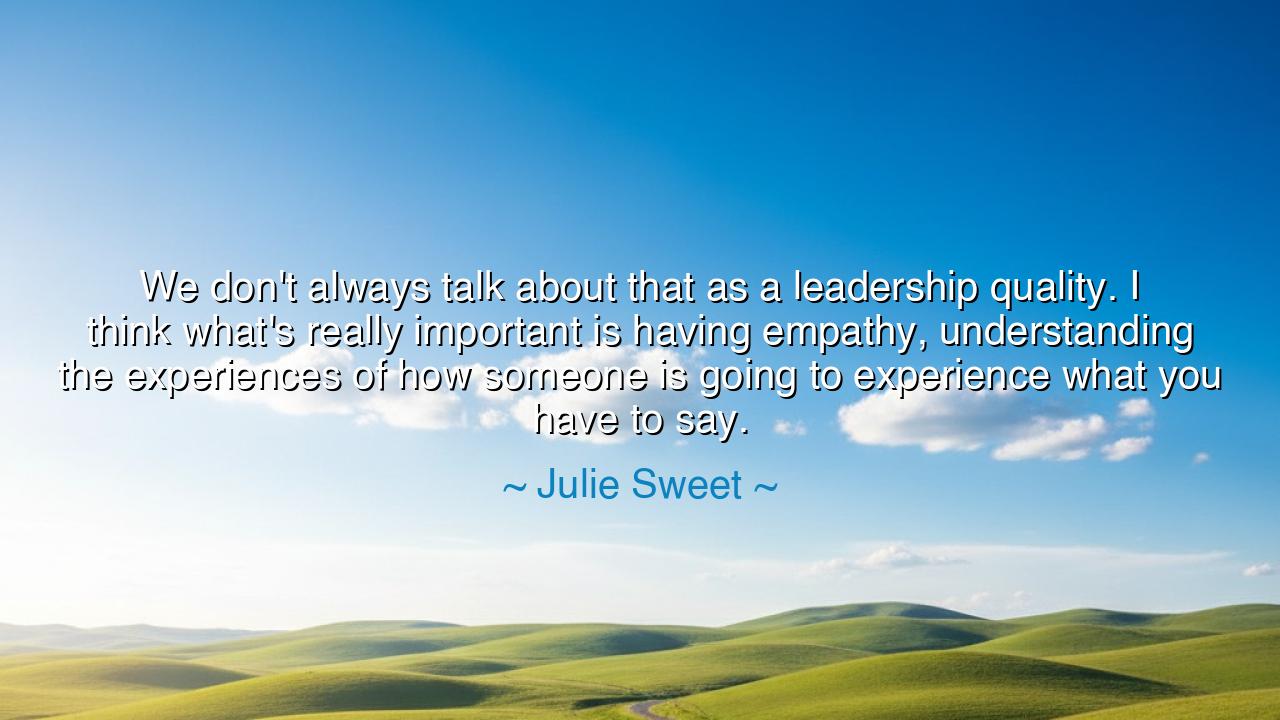
We don't always talk about that as a leadership quality. I think
We don't always talk about that as a leadership quality. I think what's really important is having empathy, understanding the experiences of how someone is going to experience what you have to say.






There are many who speak of leadership as strength — of power, of command, of the ability to move others by force of will. Yet Julie Sweet, a woman of sharp intellect and quiet conviction, reminds us of a truth too often forgotten: that empathy is not weakness but the very essence of true leadership. Her words, “We don't always talk about that as a leadership quality… what’s really important is having empathy, understanding the experiences of how someone is going to experience what you have to say,” pierce through the illusions of authority. They teach us that the art of leading is not merely to speak, but to feel the weight of one’s words as they land upon another soul. Leadership is not a tower from which we issue decrees, but a bridge — delicate, human, and alive — between hearts.
In the ancient schools of Athens, where philosophers gathered beneath olive trees, there was once a teacher who seldom raised his voice. His students said that when Socrates spoke, he seemed to speak not to them, but through them — as though he first entered their hearts, understood their doubts, and only then replied. He led not by dominance but by understanding. This was empathy in motion: the quiet strength of one who seeks first to perceive before persuading. Such a leader transforms conflict into communion, and difference into discovery.
Empathy, as Julie Sweet reveals, is the unseen thread that binds communication to wisdom. For when a leader speaks without understanding, his words fall like stones upon fertile soil, bruising instead of nourishing. But when one pauses — truly pauses — to consider how another will receive what is said, then words become seeds that take root in the heart. This kind of awareness is not born of training or position, but of deep humanity. The great kings, prophets, and reformers of history — from Abraham Lincoln’s sorrowful humility to Nelson Mandela’s patience and grace — each knew this: to lead without empathy is to command empty vessels, but to lead with empathy is to awaken living souls.
Consider the story of Lincoln at the height of the Civil War. Amid betrayal, bloodshed, and despair, he was urged to punish the defeated South with iron justice. Yet Lincoln replied, “I shall treat them as if they had never been my enemies.” He understood not just politics, but the human heart — the anguish of loss, the pride of a broken people. That act of empathic leadership began the healing of a nation. He saw beyond anger and into experience; beyond victory and into reconciliation. Thus, Lincoln’s greatness did not spring from might, but from mercy — the kind Julie Sweet speaks of when she urges leaders to feel before they speak.
For what is empathy if not the divine mirror of wisdom? It demands that we imagine ourselves within another’s sorrow, confusion, or hope. It calls us to shape our message so that it may heal rather than harm, guide rather than wound. The ancients would call this “right speech” — a virtue of sages, a sign that the spirit governs the tongue. When empathy rules our words, leadership ceases to be performance and becomes service. And service, dear listener, is the highest form of power.
In our age of noise and haste, where communication is often sharpened like a blade, understanding becomes the rarest of gifts. Julie Sweet’s insight stands as a quiet rebellion against this brutality of speech. To pause before speaking — to feel how our truth might touch another’s heart — is not hesitation but wisdom. Such empathy tempers authority with grace and turns mere leadership into stewardship.
The lesson, then, is clear and eternal: to lead is to listen, and to speak with care for how one’s truth will be felt. Let every word we utter be measured by its impact upon another’s spirit. Let us cultivate the discipline of empathy — in our homes, in our work, in our nations. Before speaking, breathe. Before commanding, understand. For it is not power that endures through the ages, but compassion — the kind that gives every voice a chance to be heard, and every heart a reason to follow.
And so, let Julie Sweet’s teaching echo as a quiet commandment to all who aspire to lead: Empathy is the first and last act of leadership. It is the unseen strength that turns speech into wisdom, and wisdom into peace.






AAdministratorAdministrator
Welcome, honored guests. Please leave a comment, we will respond soon